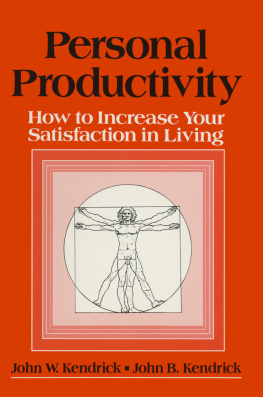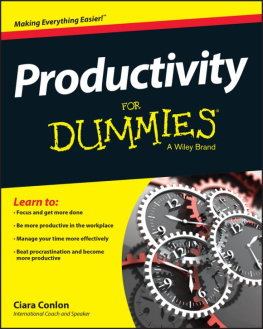John W. Kendrick - Personal productivity : how to increase your satisfaction in living
Here you can read online John W. Kendrick - Personal productivity : how to increase your satisfaction in living full text of the book (entire story) in english for free. Download pdf and epub, get meaning, cover and reviews about this ebook. year: 1988, publisher: M.E.Sharpe, genre: Home and family. Description of the work, (preface) as well as reviews are available. Best literature library LitArk.com created for fans of good reading and offers a wide selection of genres:
Romance novel
Science fiction
Adventure
Detective
Science
History
Home and family
Prose
Art
Politics
Computer
Non-fiction
Religion
Business
Children
Humor
Choose a favorite category and find really read worthwhile books. Enjoy immersion in the world of imagination, feel the emotions of the characters or learn something new for yourself, make an fascinating discovery.
- Book:Personal productivity : how to increase your satisfaction in living
- Author:
- Publisher:M.E.Sharpe
- Genre:
- Year:1988
- Rating:3 / 5
- Favourites:Add to favourites
- Your mark:
- 60
- 1
- 2
- 3
- 4
- 5
Personal productivity : how to increase your satisfaction in living: summary, description and annotation
We offer to read an annotation, description, summary or preface (depends on what the author of the book "Personal productivity : how to increase your satisfaction in living" wrote himself). If you haven't found the necessary information about the book — write in the comments, we will try to find it.
Personal productivity : how to increase your satisfaction in living — read online for free the complete book (whole text) full work
Below is the text of the book, divided by pages. System saving the place of the last page read, allows you to conveniently read the book "Personal productivity : how to increase your satisfaction in living" online for free, without having to search again every time where you left off. Put a bookmark, and you can go to the page where you finished reading at any time.
Font size:
Interval:
Bookmark:
John B. Kendrick

2 Park Square, Milton Park, Abingdon, Oxon OX14 4RN
711 Third Avenue, New York, NY 10017, USA
No responsibility is assumed by the publisher for any injury and/or damage to persons or property as a matter of products liability, negligence or otherwise, or from any use of operation of any methods, products, instructions or ideas contained in the material herein.
Personal productivity.
Includes index.
1. Time management. 2. Finance, Personal. 3. Labor productivity
Psychological aspects. 4. WorkPsychological aspects.
I. Kendrick, John B. II. Title.
HD69.T54K46 1988 87-28472
640'.43dc19 CIP
ISBN 13: 9780873324625 (hbk)
| Investments in Self: Education, Training, and Mobility |
| Productivity Growth and the Pursuit of HappinessThe End |
| Prototype Worksheet for Goal-Setting by Major Area of Personal Activity |
| Age and Experience Profiles of Relative Annual Earnings of White, Nonfarm Men, 1959 |
| Key Components of a Personal Financial Management System |
| Illustrative Calculations of Satisfaction Quotients by Areas of Personal Activity |
| Sources of Personal Income in the United States, 1985 and 1986 |
| U.S. Full Personal Income from Productive and Leisure Activities, by Source, 1985-1986 |
| Disposition of Personal Income in the United States, 1985 and 1986 |
| Disposition of U.S. Full Personal Income, 1985 and 1986 |
Font size:
Interval:
Bookmark:
Similar books «Personal productivity : how to increase your satisfaction in living»
Look at similar books to Personal productivity : how to increase your satisfaction in living. We have selected literature similar in name and meaning in the hope of providing readers with more options to find new, interesting, not yet read works.
Discussion, reviews of the book Personal productivity : how to increase your satisfaction in living and just readers' own opinions. Leave your comments, write what you think about the work, its meaning or the main characters. Specify what exactly you liked and what you didn't like, and why you think so.












